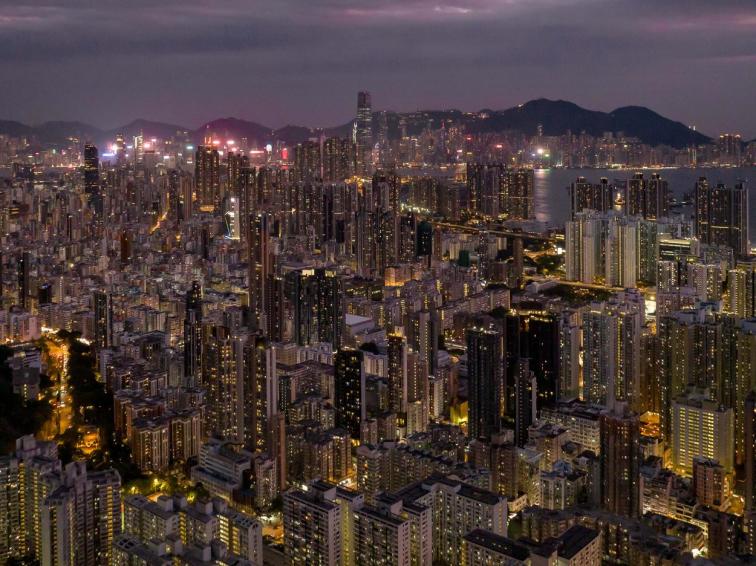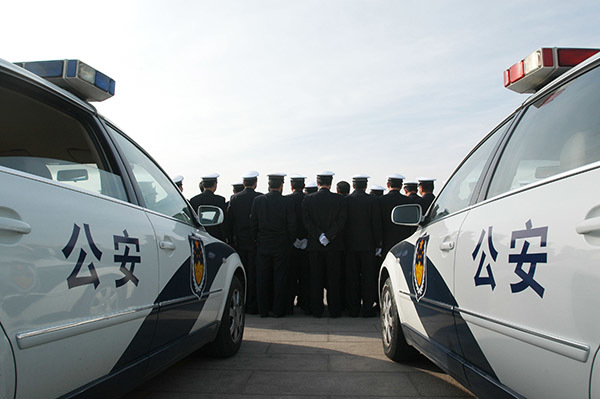Photo Caption: Chinese Communist Party leader Xi Jinping and Premier Li Keqiang (second from left) at the closing ceremony of the 20th National Congress of the Communist Party of China. Former President Hu Jintao was forcibly escorted out early. The congress concluded at the Great Hall of the People in Beijing, where Xi was expected to secure his third term. (Photo by Kevin Frayer/Getty Images)
[People News] On May 19 and 20, major Party mouthpieces such as Xinhua News Agency and People’s Daily published a striking article on their front pages titled “Persist in Scientific, Democratic, and Law-Based Decision-Making to High-Quality Complete the '15th Five-Year Plan' Drafting Work”. The article stressed the importance of scientifically crafting plans and used Xi Jinping’s words to highlight Hu Jintao’s Scientific Outlook on Development: the need to uphold scientific, democratic, and law-based decision-making. Strikingly, the article, despite being featured so prominently, was unusually short, only about 360 words, and made no mention whatsoever of “Xi Jinping Thought,” “Xi as the core,” or “socialism with Chinese characteristics for a new era.”
For those skilled at reading between the lines of CCP propaganda, this signalled a major change brewing in Zhongnanhai. Historically, every major policy shift or personnel shake-up in the Party is foreshadowed by signals in official media. For example, Maoist-style dazibao (big-character posters) before campaigns against Liu Shaoqi and Lin Biao, the “Practice Is the Sole Criterion for Testing Truth” article that paved the way for Hua Guofeng's ouster, or the sudden halt to nationwide fitness campaigns and calls to “respect science” before Jiang Zemin’s persecution of Falun Gong.
Now, given that Hu Jintao was publicly escorted out of the 20th Party Congress, why is the Party media now conspicuously omitting all praise of Xi Jinping and instead resurrecting Hu’s governance philosophy? Political observers believe the Party media may be hinting that “Hu Jintao is making a comeback, while Xi Jinping is being forced to step down.” Rumours have recently circulated that “Party leader Xi has lost military control, been weakened within the Party, and may be forced to hand over power at the Fourth Plenary Session in late August”—and such talk may not be entirely baseless.
Economist and poet Su Xiaohé commented that, without a doubt, Hu Jintao has already “made a comeback.” He is likely steering the top of the CCP again and is preparing to convene a Politburo enlarged meeting to review Xi Jinping’s policy blunders over the past decade-plus.
Analysts suggest a retrospective investigation into the 15 years of governance since the 18th Party Congress is underway. Initially, Xi gained authority by toppling Zhou Yongkang, promoting the revival of traditional culture, and advancing a “no forbidden zone” anti-corruption campaign—moves that resonated with public sentiment. But later, to preserve Party rule, Xi launched numerous wasteful, fraudulent, and harmful initiatives: Xiong’an New Area, the Belt and Road Initiative, “moderate prosperity for all,” the so-called “victory” over COVID, anti-American alignment with Russia, suppression of private enterprises, persecution of the populace, and so on. His erroneous decisions raise tough questions: Why has anti-corruption only led to more corruption? Why has people's livelihood deteriorated? Why are natural and man-made disasters increasingly frequent?
Su Xiaohé identifies three major errors by Xi Jinping: 1. Destroying Hong Kong’s high degree of autonomy. 2. Issuing religious regulations that crushed already fragile religious freedoms in China, turning the country into a full-blown dictatorship. 3. The zero-COVID lockdowns in Wuhan dragged the national economy into a steep decline over three years.
At present, the CCP is mired in a comprehensive crisis—economically, socially, and politically. Economically, stock, real estate, currency, and bond markets have all faltered despite stimulus efforts. Socially, resentment toward officials and the wealthy, along with killings, suicides, and mutual betrayals, is rampant. Politically, unexplained deaths of senior officials are frequent, and many top-level cadres across the Party, government, and military have “disappeared.”
All signs point to Xi facing a governance crisis, with the CCP regime in extreme turmoil. The Fourth Plenary Session has not yet convened, and the coming period is likely to bring unexpected developments.
There are already reports that in mid-May, the CCP top brass secretly held an extraordinarily rare expanded meeting of the Central Politburo. Attendees included surviving Party elders, senior military figures, former Politburo Standing Committee members, and veteran cadres—essentially all living historical figures within the Party. The last time such a meeting was held was in 1989. This time, the meeting focused on one topic only: whether Xi Jinping should step down.
Reportedly, the meeting featured five shocking developments: Hu Jintao made a rare and powerful appearance, even stating that “even if it means civil war, we must rescue reform and opening.” Wen Jiabao reportedly expressed remorse for having supported Xi Jinping in the past. A possible Politburo Standing Committee reshuffle was discussed, with the Tuanpai (Communist Youth League faction) projected to take up a third of Central Committee seats. Zhang Youxia read aloud the names of all fallen senior military officials, almost all of whom were Xi loyalists. Core figures including Zhang Youxia, He Lifeng, Wang Yi, Ma Xingrui, and Yin Li seemingly distanced themselves from Xi.
In February this year, overseas independent commentator Cai Shenkun revealed on X and YouTube that Xi Jinping had effectively lost real power. Authority had been temporarily handed over to three elders, all born in 1942, to manage a transition. Military power now rested with Zhang Youxia, and Xi’s title as Chairman of the Central Military Commission was purely nominal. Cai predicted that Xi’s formal exit would be announced no later than next year. He later identified the three elders as Hu Jintao, Wen Jiabao, and Hu Deping.
If that’s the case, speculation is growing that if Xi loses power, his personal and family safety could be in jeopardy. Over the past 15 years, he has made enemies across the Party, the military, and the populace. Elders believe he’s ungrateful, princelings and second-generation red elites say he’s autocratic, reformists say he’s taken a dead-end path, and even hardliners think he’s too extreme. Numerous political and military “tigers” have been purged as his rivals, all bearing deep resentment. Xi himself reportedly said those around him “wish him dead.” And the people have suffered tremendously under the dictatorship and lost all hope in their livelihoods. Crucially, if Hu Jintao returns to power, will he, haunted by the public humiliation of being forcibly removed from the Party Congress, seek a symbolic revenge by having the person who ousted him escorted out in a similar manner?
On May 6, independent commentator Cai Shenkun revealed that, faced with current international conditions, domestic economic troubles, and Xi’s own health issues, CCP elders had reached their limit. They collectively forced Xi into a corner, demanding that he fully and peacefully exit the political stage. A new leadership would soon emerge with new approaches.
This dramatic showdown is unfolding. Before the Fourth Plenary Session, will a political tsunami erupt in Zhongnanhai? Let’s wait and see.
(Originally published by People News)










News magazine bootstrap themes!
I like this themes, fast loading and look profesional
Thank you Carlos!
You're welcome!
Please support me with give positive rating!
Yes Sure!